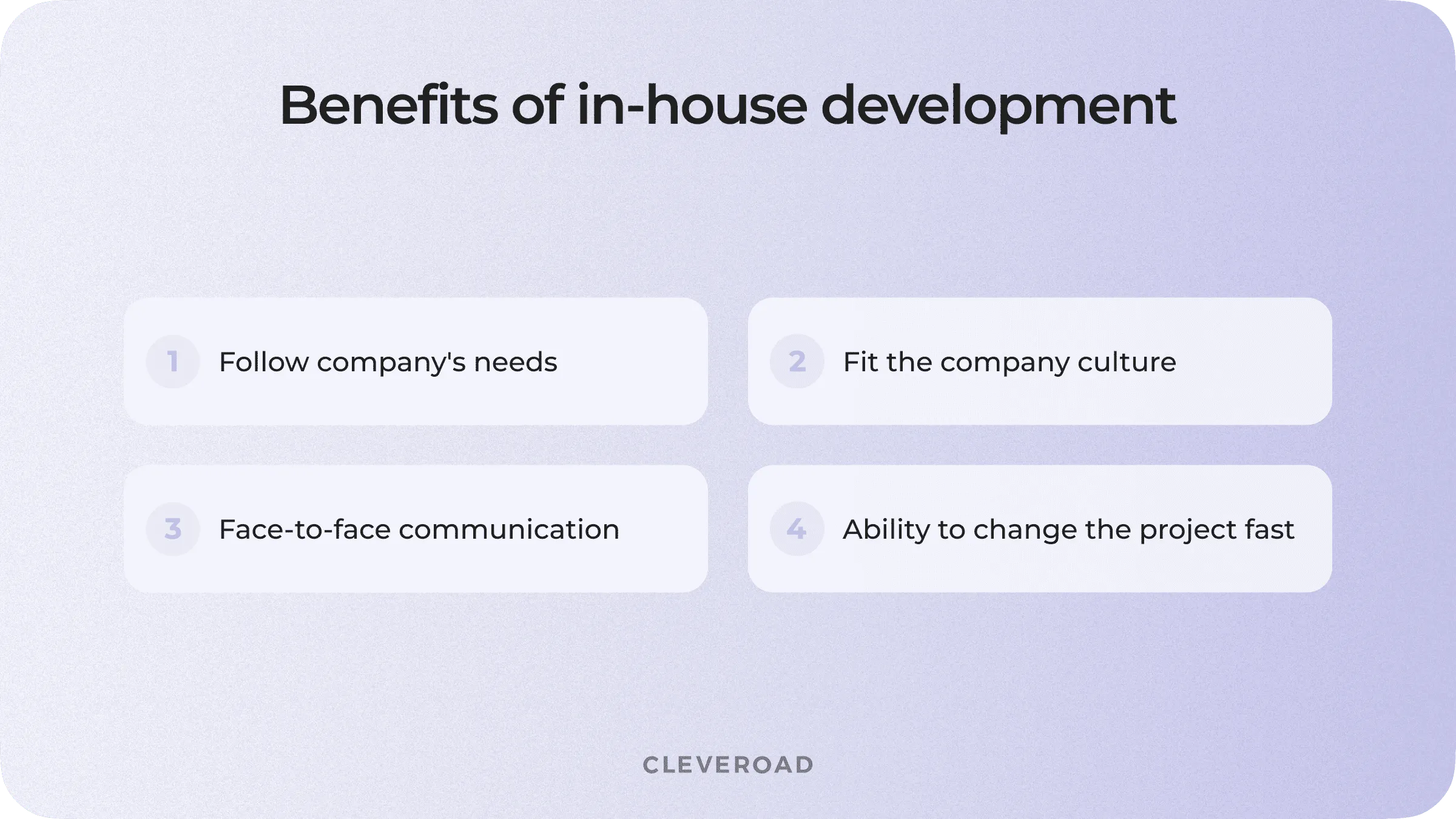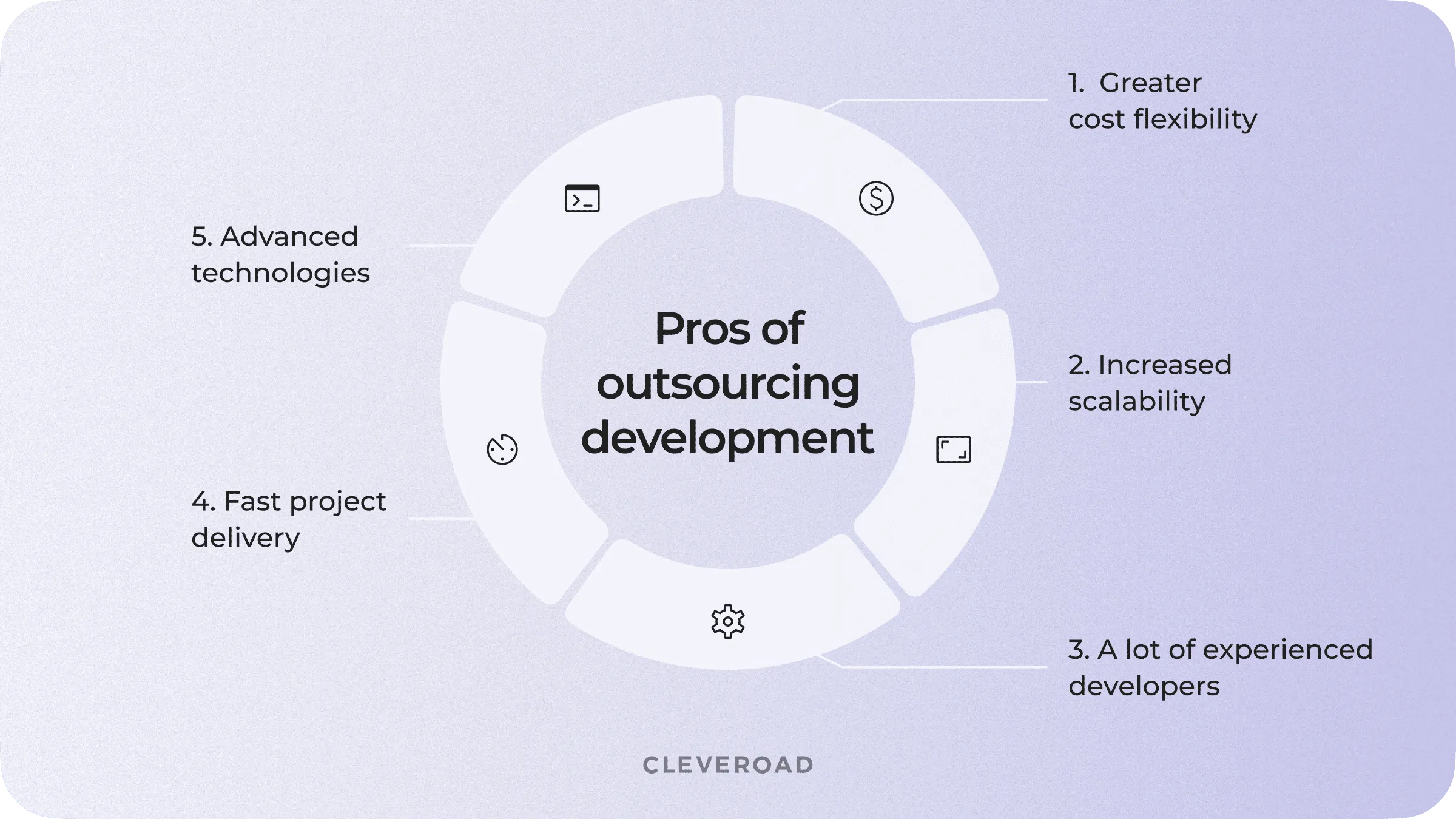In-House vs. Outsource Software Development: Which Option to Choose
Updated 02 Jun 2023
13 Min
29584 Views
If you decide to build software for your business, you need to determine how to organize the development process. So the question arises: what to choose —in-house vs. outsource software development?
Before we get into the details of each option, let's briefly overview these concepts. The main difference between in-house and outsource software development is its collaborative approach. In the first case, you need to start by finding and hiring the necessary experts to make an app or website. In the second case, you get a formed team of professionals who will provide a full package of software development services.
This article reveals each option's pros and cons and shows their main differences. Let's begin to get into the details.
Choosing In-House Development: Advantages and Disadvantages
Let's consider the concept of in-house development in more detail. The key feature of this approach is that all the specialists involved in creating software are your company's employees. So, suppose you don't own an IT services business. In that case, you need to hire all the necessary experts (developers, UI/UX designers, QA engineers, business analysts, and more) before you start building the application or website. This option has both advantages and disadvantages.
Advantages of in-house development
An in-house team is a great way to start developing your own products. It is unlikely that this method would be popular if it did not have significant advantages for itself. We will talk about them briefly now.
Cultural fit
Developers that work as permanent team members tend to pay much more attention to the specific needs of a company. It means they’re motivated to achieve the best results and bring as much value as possible. It’s easier for in-house developers to integrate with your company’s culture.
Face-to-face communication
Having the same working hours and being in one office makes communication more comfortable and clear. Direct conversations help avoid misunderstanding and increase effectiveness.
Quick changes
When you have an in-house team of software developers, it’s always faster to change the project's features, add new ones, and discuss their technical background. Also, in-house developers usually process bugs more quickly.

Advantages of in-house development
Disadvantages of in-house software development
Nothing in this world is perfect and in-house also has some imperfections. You, as a product owner or someone who is going to create your own digital solution, should be aware of them so that these disadvantages do not take you by surprise.
High cost
The price is an issue that can change everything. It’s obvious that in-house development is much more expensive than cooperating with a vendor. The final price makes up of many expenses like rent, taxes, software, hardware, and more. In fact, there are some additional spendings like training for employees, sick days and benefits.
Staff turnover
Software developers have a tendency to change the working place quite often. It happens because the demand for talented developers is high, and other companies tend to offer better working conditions. As a result, you may face some challenges with labor and lose time. Finding a new developer is always time-consuming, so your project development can be stopped or slowed down for some time.
Lack of tech talents
The ever-rising IT market brings an overwhelming demand for tech specialists. It's already tough to hire the right person in some regions. Apart from meeting soft and hard skills, the developer should fit into the planned budget. Which is often hard because of competition from other companies.

Disadvantages of in-house development
Companies with in-house teams
So, we’ve already found out the advantages and disadvantages of in-house software development. There are several examples of companies that have formed in-house teams of employees.
- Amazon
- Salesforce
- PayPal
Wrapping up this part, in-house development may require more time due to difficulties with hiring the right employees. For many regions, this variant is also an expensive one because of all the unexpected additional expenses, e.g. training, sick days, benefits. However, you may prefer hiring an in-house team for long-time cooperation.
Choosing Outsourcing Software Development: Pros and Cons
According to Statista research, the IT outsourcing market turnover is expected to become approximately $587.30bn by 2027. So nowadays, many companies use outsourced software development services to cut costs, save time, and find competent staff.
If you choose to outsource software development, you need to find a vendor with solid expertise and positive customer reviews. Then, a team of specialists will create an application that meets your requirements and help you deploy it.
Let’s discuss the pros and cons of hiring a software development vendor.
Advantages of outsourcing software development
Outsourcing the development of software solutions for business has undeniable advantages, due to which this development method is one of the most popular.
Cost flexibility
There are a lot of outsourcing companies all over the world that offer affordable prices. The most popular regions for outsourcing are Central and Western Europe, the Baltics, Eastern Europe, the Balkans, and more. Central Europe is becoming increasingly popular due to a bunch of talent, low taxes, and government support of the IT sphere. We’ve done research on software development costs in Europe, and you can see the results in the picture below.

Software development rates in different parts of Europe
Huge talent pool
As mentioned above, the IT outsourcing market provides a huge pool of technical specialists with both knowledge and experience. As a result, the hiring process can take just a few days, not months. Outsourcing provides you with unlimited hiring opportunities. You can consider different professionals from all over the world that have different skills and experience and choose the best engineer.
Scalability
Another reason to hire a reliable vendor is an opportunity to scale up and down. What does it mean? You can make your team bigger if you need to speed up the development process or decrease the number of specialists if there are no tasks for them to tackle.
Faster project delivery
Outsourcing software development allows for reducing the time spent on recruiting. You can always adjust the speed of your project development, e.g., cooperating with more specialists. As a result, time to market decreases along with expenses (you don’t need to pay if there’re no tasks).
More technologies to choose from
A vendor can offer you to hire a software developer with the required skill set. For example, it’s extremely hard to hire a Perl developer in your region. But there are a lot of regions all over the world, so you can find a qualified specialist in some regions.

Benefits of outsourcing software development
Disadvantages of outsourcing software development
Despite significant advantages, outsourcing development to other countries has several small disadvantages you should be aware of.
Security
Outsourcing usually suffers from a lack of face-to-face communication. As a result, you can’t control the whole development process and may not feel well-protected. However, the amount of trust always depends on the vendor. So, be sure to discuss the ways to communicate beforehand. If you are afraid that your idea and groundworks will be stolen, you should sign an NDA contract. This agreement guarantees the protection of all your rights and the project idea.
Discover how to protect your project idea with an NDA agreement
Communication
Locating in different companies, there are several issues that you need to solve. A lot of people worry about the language barrier problem. However, it has become a thing of the past since IT specialists tend to have fluent English. The time zone difference is another communication-related issue you can face choosing outsourced software development. But vendors typically have a comfortable solution for both sides, like scheduling the meeting beforehand or using emails and messengers.
Companies that outsource software development
There are several examples of companies that have outsourced their software development and got substantial benefits.
- Google. This IT giant tends to outsource parts of their projects in order to reduce costs.
- Slack. It’s a popular tool among companies for internal communication. The development of Slack was outsourced to the software development company that created both web and mobile application.
- Expensify. This platform assists users in collecting expenses and keeping track of transactions. This software was developed by an outsourcing company that takes care of back-end development.
Outsourcing software development is a great solution if you want to create a high-quality product at a reasonable price. Outsourcing can be profitable for both variants — if you aren’t familiar with software development and if you are an IT company.
Considering the first option, you don’t need to manage tasks and plan the developers’ work. As for the second one, you can outsource parts of your projects as Google does.
The Difference Between In-House and Outsource Software Development
Let's summarize the main differences between in-house development vs. outsourcing.
Cost
In-house software development will cost you more because of the additional recruitment, resources, and equipment costs. In turn, outsourcing is cheaper because you only pay for the team's work. Moreover, you can choose a region with lower hourly rates, which will significantly reduce the app development cost.
Development time
In-house development may take more time due to the limitation of the team size. In contrast, outsourced teams can build software faster due to all the specialists required to deliver your product idea: from planning to development and implementation.
Expertise and technology
When you work with an in-house team, you are limited by the skills and technology of your staff. In contrast, when cooperating with an outsourcing vendor, you can ask to involve additional specialists or implement a technology that was not planned initially without wasting time searching for the right expert.
Scalability and flexibility
It takes quite a long time to assemble the in-house team, so if you need more experts to complete the project faster, you still have to spend a lot of time searching for them. On the other hand, outsourcing involves expanding the team on demand, so you can easily scale it up and down depending on your needs.
Management and communication
It is easier to manage your staff with personal communication, so if you employ in-house developers, you can control the process more efficiently. On the other hand, cooperating with the outsourcing team, you may face time zones or language barriers. However, experienced IT providers like Cleveroad make personal communication plans with clients to hold meetings in a time that's convenient for the customer. Moreover, our specialists are fluent in English so you may be assured that our team will understand exactly what's expected of them.
Security
You can always control the company's data protection by working with an in-house team. Outsourcing providers, on the other hand, are more challenging to manage. However, you can choose software vendors that work under Non-Disclosure Agreements (NDAs) to ensure safety. For example, the Cleveroad team always signs NDAs per the client’s request.
| In-house team | Outsourcing | |
Cost | High | Depends on chosen region |
Expetise & tech | Limited | Extensive and various |
Scalability | Limited capabilities | Expanded capabilities |
Time | Slower | Faster due to all experts available |
Security | High | Signing an NDA |
Management | Simpler and more efficient | Have PMs on the side to keep you posted on the condition |
In-house Software Development vs. Outsourcing: What to Select
Now you know all the differences between in-house software development vs. outsourcing and their pros and cons. But how to decide which option is best for your case?
When to choose outsourced development
Delegating the creation of software will be a better choice if:
Your budget is limited. If you need to develop software but are not ready to afford additional expenses for your team, turn to an outsourcing software provider. So you can hire a team of developers from anywhere in the world, and you're sure to find an option that satisfies you with high product quality and affordable hourly rates.
Tight timeframes. If you need to launch a project quickly, you may not have time to find specialists and assemble a team. If this is the case, you can turn to an experienced vendor to help you launch the product as quickly as possible. They will provide you with MVP development services, allowing you to deliver software with minimal investment to test your product idea and collect customer feedback.
Lack of local talent. It is possible that your city or even country does not have enough specialists you need. In this case, it is worth looking for them abroad.
You need a clear plan. If you have an idea for software but are unsure how to implement it, an outsourced software provider can help you transform unclear requirements into a clear implementation roadmap. For example, the Cleveroad team always provides clients with Discovery phase services. It implies an in-depth analysis of business and project requirements to prepare a ground for creating software perfect for your purposes.
When you need in-house development
Staffing your in-house team may be a good option for you if:
You have no budget constraints. If your company can afford the time and financial cost of hiring and working with in-house experts, you can get the most out of the benefits of this option and minimize the downsides. But keep in mind that this type of cooperation is related to additional costs (purchasing software and hardware, leasing premises, payment of wages, taxes, sick leave, etc.)
Complete control is critical to you. You will be more comfortable working with an in-house team if you want to control all development stages and each employee's work. However, if you're pressed on time, you'll have to hire project managers to guide and control the projects.
How to Outsource and Not to Fail?
Having your software development outsourced requires some preparation. That’s why we’ve decided to prepare several useful hints to make the outsourcing process more comfortable and profitable.
Be careful with low hourly rates
As it was mentioned, the developers in Central Europe and Asia are quite cheap, but the quality of their services is different. For example, Estonian developers have a reputation as well-educated specialists who offer reasonable prices. However, there is an opinion that Indian engineers have lower hourly rates, but they are not well-qualified.
Discover how to hire a dedicated development team making no mistakes
Study previous projects
When you want to hire an outsourcing company, start by checking the references along with their reputation. Each reliable vendor tends to show the released projects, e.g., you’re welcome to look through Cleveroad’s portfolio.
Such services as Clutch and GoodFirms can help you learn the prices of companies across the globe and read reviews from their previous clients.
Protect your data
We’ve already mentioned an NDA agreement that has to be signed to protect your project idea as well as any development processes. Moreover, the contract should contain a piece of information about the procedure of data collection, transfer, access, and more.
Software development companies should follow the EU General Data Protection Regulation (GDPR).
Note! Cleveroad has already developed the system to comply with GDPR.
Check the transparency
To follow the development process and be up to date, you need to opt for project management tools. Utilizing track web apps, you can see how the software builders work and how much time they spend. The most popular tools for tracking are:
As a result, you are completely involved in your transparent project creation. Vendors constantly work on their reputation and trustful relationship with their clients, so it shouldn’t be a problem for them to give you access.
At Cleveroad, we tend to be as transparent as possible with our clients. Our software development team prefers using Jira. So, we can provide you with access to this tool, and you can track the tasks and spend time.
Why Hire Software Developers at Cleveroad?
Cleveroad is a professional software and mobile app development vendor with over 10 years of experience in the market. We have extensive experience in providing a wide range of services, from developing custom solutions to supporting and upgrading legacy software. We offer reasonable hourly rates along with highly qualified developers.
Cleveroad in numbers:
- 10+ years on the market
- 120+ in-house engineers
- 170+ successful projects
- 8+ expertise industries
There are three main reasons to outsource your project development to our company:
- Our developers and project managers have fluent English, making communication easy and comfortable.
- If we are located in different time zones, our PMs will follow your schedule to keep you updated.
- The developers use modern technologies to build applications and websites. They tend to visit various workshops, conferences, and more to expand their knowledge.
Hire outsourced developers
The Cleveroad team will answer all your questions and create software that suits your business goals
Unfortunately, there is no sure way to tell whether you need to choose the path of outsourcing or in-house development. Everything depends on project requirements and your objectives.
The in-house software development team means a team of engineers that works in your office. This variant usually requires more time and money due to time-consuming interviews, onboarding processes, and training.
Advantages of in-house development
- Cultural fit
- Face-to-face communication
- Quick changes
Disadvantages of in-house software development
- High cost
- Staff turnover
- Lack of tech talents
Advantages of Outsourcing Software Development
- Cost flexibility
- Huge talent pools
- Faster project delivery
- More technologies to choose from
- Scalability
Disadvantages of Outsourcing Software Development
- Security risks
- Communication gap
In-house software development team means a team of engineers that works in your office. This variant usually requires more time and money due to time-consuming interviews, on-boarding processes, and training.
Outsourcing development stands for cooperating with a software development team from another country. This variant allows reducing expenses. Nowadays, a lot of companies make use of outsourced software development services to cut costs, save time, and find competent staff.

Evgeniy Altynpara is a CTO and member of the Forbes Councils’ community of tech professionals. He is an expert in software development and technological entrepreneurship and has 10+years of experience in digital transformation consulting in Healthcare, FinTech, Supply Chain and Logistics
Give us your impressions about this article
Give us your impressions about this article
Comments
1 commentsThanks for sharing such great information, I highly appreciate your hard-working skills which are quite beneficial for me.